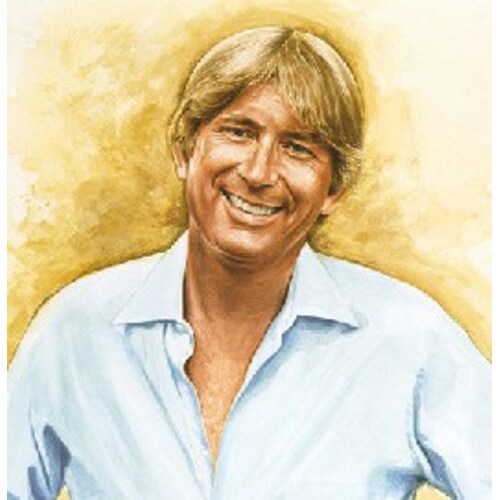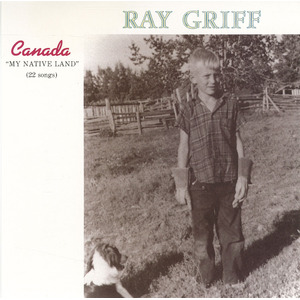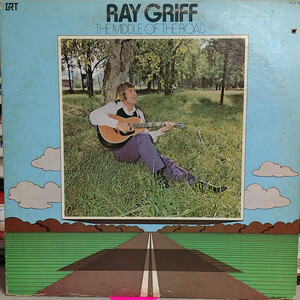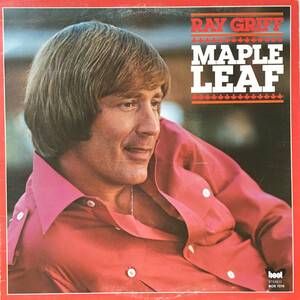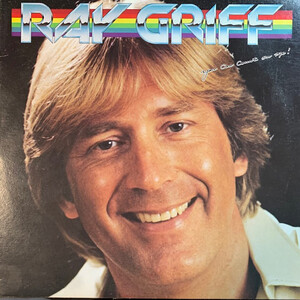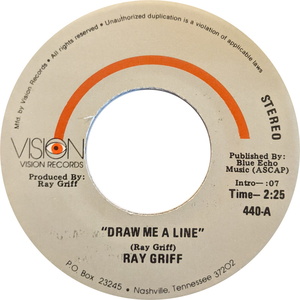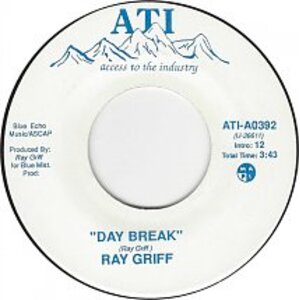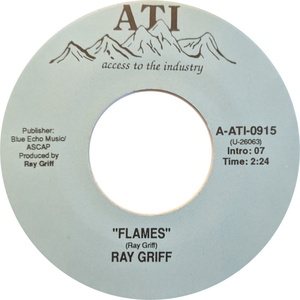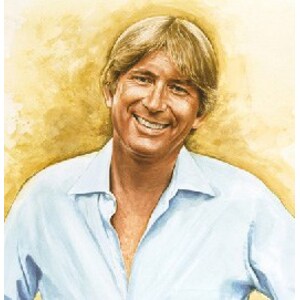Griff, Ray
Websites:
No
Origin:
Vancouver, British Columbia - Winfield - Calgary, Alberta, 🇨🇦
Biography:
Ray Griff is where Nashville country music, Canadian country music, and rock'n'roll intersect. Ray has written and/or recorded more country hits than any other Canadian songwriter in history. One of the first country artists—if not the first—to produce his own hits, Ray is a one-man country music juggernaut: singer, songwriter, musician, producer, publisher, promoter, and label owner. He has also hosted his own Network TV shows Good Time Country and Up-Town Country and the classic country music radio show Raymond's Place.
Born on April 22 in Vancouver, B.C., Ray was the younger of two sons by Katherine and George Griff. Due to a breakup of the marriage and financial hardship, Katherine left with her two sons and moved to Winfield, Alberta, where she found employment as a bookkeeper. Katherine was a beacon of light and a pillar of strength for her boys. Her sheer determination and years of sacrifice molded Ray. She had an appreciation for music and recognized that her son Ray had a special gift when, at the age of seven, he wrote his first song, "Blue Bells."
With a great love for music, at the age of eight, Ray, along with his brother Ken and three other local kids, formed a band calling themselves The Winfield Amateurs, a title that later became one of Ray’s most popular songs. Ray sang and played drums in the band. Saving his pennies, Ray purchased a Palm Beach guitar through a mail-order catalogue. A milestone came when his mother scraped together enough funds to buy an old upright piano. Since there was no money for lessons, Ray taught himself how to play both instruments. With a stuttering problem, it was very difficult for Ray, but he was determined to do something special with his life. When Ray turned twelve, the family moved to Calgary, Alberta.
Coming into adulthood, Ray worked at a grocery store after school and on weekends to help pay the family bills. Ray loved sports and, although there was little time to participate, he received a special invitation from the Canadian Olympic Committee after he set a record in the long jump at a city track meet. In his quest for a music career, Ray felt it best to decline. He fronted his own band The Blue Echos in the late '50s and began to earn a name for himself in and around Calgary, performing at high school hops and local community functions.
Ray wrote his first commercial song when he was 14, and at 17, he was asked by local radio personality and concert promoter D'Arcy Scott to be the opening act for one of his heroes, Johnny Horton, on a tour of Western Canada. His dreams were beginning to come true. During the tour, Ray played a song he had written for Johnny called "Mister Moonlight," which Johnny recorded and included in his classic album The Battle of New Orleans, just prior to his tragic death in a car accident in 1960.
Ray was the first live entertainment to perform in Calgary after the liquor bill was passed. At seventeen, in an effort to earn enough money to make a trip to Nashville, Ray quit school and went to work for an appliance company cleaning used refrigerators, then took a job with Trans Canada Airlines as an office boy. By playing music on weekends, he was able to save enough money to make his first trip to Nashville in 1961, leaving countless tapes of his songs with music publishers and record labels and recording his song "The Racing King" during his first session as an artist. Released on his own label, Ray Records, and distributed by Quality Records, the record received a lot of airplay on the Canadian pop charts.
In 1962, Ray presented his gospel song "Where Do I Go From Here" to another of his heroes, Jim Reeves, when Jim was in Calgary on a concert tour—a song that Jim later included on one of his gospel albums. Jim continued to be a mentor and friend to Ray, encouraging him to move to Nashville, which he did in 1964 after finishing up a nightclub tour of Eastern Canada. Shortly after Ray's arrival in Nashville, his friend and mentor Jim Reeves was killed in an airplane crash. Devastated and alone with forty dollars in his pocket and a million dreams, Ray spent the first few weeks sleeping in his car—a frightful dilemma.
No stranger to work, Ray kept on keeping on, always remembering his mother's words: "Hold fast your dreams." He immediately worked toward stabilizing his situation. He rented a room in a cockroach-infested rooming house with a shared bathroom. He got a job repairing piano keys from 7:00 a.m. to 3:00 p.m., pitched his songs to record labels from 3:30 to 5:30 p.m., worked at a record pressing plant from 6:00 to midnight, somehow still managed to write songs, entertain at a club in Bowling Green, Kentucky on weekends, and earn his high school diploma through a correspondence course.
Bob Ferguson, the writer of the gospel standard "The Wings of a Dove" and a record producer at RCA, was so impressed with Ray that he hired him to pitch songs for his publishing company. Ray's fee was thirty dollars a week and a place to sleep in the back of the office. It wasn't long before Ray was in the studio, self-producing and recording "Don't Lead Me On" and "That Weepin' Willow Tree." The session was presented to Chet Atkins at RCA, and Ray was signed to its subsidiary label, Groove Records. The record began breaking out across the southern United States and Canada, and it had the makings of a huge hit—until politics and artistic differences led to Ray being let out of his contract.
Ray’s breakthrough as a songwriter came in 1965 when he played one of his songs, "Baby," for renowned producer Owen Bradley. Owen recorded the song with Wilma Burgess, a new artist on Decca. The song hit the country Top 10, launching Wilma’s career as an artist and Ray’s career as a songwriter.
For the next twenty years, Ray remained one of the most successful songwriters and independent music publishers in country music. His successes brought him forty-eight singles in the Top 100, as well as eighty-seven ASCAP and BMI citations as a songwriter, artist, producer, and music publisher—taking home an unprecedented sixteen ASCAP awards in both 1975 and 1976. In 1989, Ray was inducted into the Canadian Country Music Hall of Fame. In 1998, he was inducted into the Canadian Country Music Hall of Honour. In 2008, Ray became the first country songwriter to receive the SOCAN Lifetime Achievement Award. In 2015, he was inducted into the Alberta Country Music Hall of Fame.
Ray wrote and published over two thousand songs, with more than seven hundred recorded by artists including Eddy Arnold, Lavern Baker, Johnny Duncan, Tennessee Ernie Ford, Crystal Gayle, George Hamilton IV, Johnny Horton, Ferlin Husky, Stonewall Jackson, George Jones, Wayne Kemp, Jerry Lee Lewis, Hank Locklin, Bob Luman, Loretta Lynn, Ann-Margret, Wayne Newton, Dolly Parton, Ray Price, Charley Pride, Del Reeves, Jim Reeves, Marty Robbins, Carl Smith, Hank Snow, Mel Tillis, Conway Twitty, Porter Wagoner, Gene Watson, Roger Whittaker, Slim Whitman, and Faron Young.
Ray also produced artists such as Judy Andrews, Sheila Ann, Jack Bailey, Roy Bee, B.J. Berg, Charlie Borchet, Marie Bottrell, Gary Buck, Glory Ann Carrier, Terry Carrise, Cori Chandler, Bernice Cochran, Laura Creegan, Dick Damron, Gracie Dee, Eddy Eastman, Gary Fairburn, Gale Gavin, Gene Gebo, Gilles Godard, Mike Graham, Keith Kitchner, Jack Holland, Doug Hutton, Chuck Irvin, Susan Jacks, Carole Ann King, Isa Lacoste, Sharon Lowness, Toni Lynn, Shelby Mason, Marla, Tracy Miller, Mylita, Jason McCoy, Ernie McCulloch, Brent McAthey, Denyce Mowery, Dick O'Leary, Par Three, Claudia Payne, Ronnie Prophet, Rebecca, Kenny Roberts, Mica Roberts, Juanita Rose, Susanne Shay, Rev. Bruce Sheasby, Ann Simmons, Garrett Storm, Kelli Veno, and John Warren.
As a recording artist, Ray had over twenty self-produced international hits.
